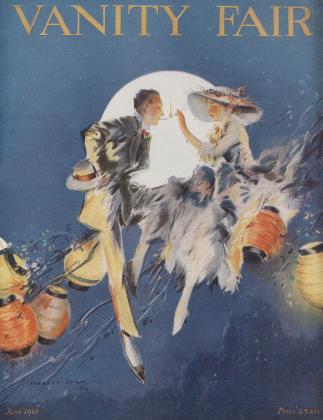Sign In to Your Account
Subscribers have complete access to the archive.
Sign In Not a Subscriber?Join NowPAUL VERLAINE IN LONDON
ARTHUR SYMONS
A Few Scattered Fragments from a Diary
ON Sunday, November 19, 1893, Muriel and I make up the spare bedroom and get it into order for Verlaine's coming. Next day no boats can cross on account of the storm. Instead of coming at 7:40 in the morning the train arrives about one after midnight. At 2:30 I go down below, and there, coming slowly through Fountain Court, a vague, mysterious figure, carrying a tiny valise and leaning on a stout stick, is Verlaine.
I take him upstairs; we sit on the sofa, a box of biscuits between us, and a little gin, and talk till five. Next day, lunch together at Court's Restaurant, Verlaine walking very painfully, leaning on my arm. In the afternoon he shows me the MS. of his lecture and asks my advice about some points, and I promise him my copy, of "Sagesse" to read from. All through the day people arriving for tickets. About four Horne and Muriel come, and Mu makes tea for us. At seven, Verlaine and Horne and I go to dinner at a private room in the Roma with Heinemann; then on to the lecture afterwards, at Barnard's Inn. Verlaine sits quietly at the table and reads in a low, agreeable, but rather indistinct voice. It is a great success, everyone is charmed; many people come forward and are introduced to him afterwards, as he sits in the picturesque chair on the little raised platform. Then we go back to the Temple, walking this time; Heinemann and Image come with us. We stay chatting and drinking, then Heinemann goes; we settle up our accounts, they go about two o'clock, and I write my little notice for the Star.
NEXT day Image comes to breakfast, then I take Verlaine to the doctor to have his foot seen to; then Image takes us to lunch at the Holborn; then Verlaine and I go on to the Bodley Head, getting back to the Temple to find Miss Belloc, the lady interviewer, waiting on the stairs. Then visitors arrive: Lane, Horne, Muriel, Crackanthorpe, Dowson, Dolmetsch. Mu makes and serves the tea, and at seven the four of us drive to the Globe, where we are to dine with Heinemann. Gosse is there, too, and we have a charming dinner. Then the Alhambra (Verlaine dates all his misfortunes from a woman he met on coming out of there twenty years ago); we see the Phantos and the Chicago ballet. Verlaine finds it just as it was before. Afterwards we go to the Crown, which is more rowdy than we have ever seen it before. Crowds of people, including a good many of our friends. Then the usual four drive back to the Temple, which we enter grandly, the gates opened for us. Next morning I put Verlaine in the train for Oxford, get into the train for Cornwall, and here I am, watching the sea down below, tossing in the bay.
VERLAINE'S memory of London was wonderful. He recognized everything he had seen before, and every change. Twenty years ago he spent a year in England; stayed with Rimbaud in Howland Street. The woman he is living with now used to be a woman of the streets. "Elle n'est pas jolie, mais c'est une bonne femme; je l'aime; elle m'aime. . . . Nous nous querrellons, nous bequetons, quelquefois elle me lance une claque a la figure, elle me traite comme un enfant; elle me fait pleurer, et j'aime ça" (he added, with a subtle smile). "Je ne suis pas beau; elle ne m'aime pas pour ma litérature; mais elle sait que je suis quelqu'un. . . ."
Perhaps if Verlaine's wife had made him weep he would still have been with her. "Mais elle était sotte." She got a divorce and married again; neither she nor their son George will have anything to do with him. He is deeply wounded by both. "Mon fils se permets de me juger." . . . This woman ("la
grosse femme"), whom he addresses as Madame Verlaine, has had a considerable influence upon him. For a long time he lost all interest in women, and all pleasure from their company. It was this woman who, as he says, "redeemed" him. "J'ai vécu enormeinent," he said of his life with her.
I remember an odd thing he said to Horne: "I like to read Shakespeare, but I prefer to see a ballet."
 View Full Issue
View Full Issue












Subscribers have complete access to the archive.
Sign In Not a Subscriber?Join Now